Swag Read online
SWAG
for Jane
Contents
Chapter 1
Chapter 2
Chapter 3
Chapter 4
Chapter 5
Chapter 6
Chapter 7
Chapter 8
Chapter 9
Chapter 10
Chapter 11
Chapter 12
Chapter 13
Chapter 14
Chapter 15
Chapter 16
Chapter 17
Chapter 18
Chapter 19
Chapter 20
Chapter 21
Chapter 22
Chapter 23
Chapter 24
Chapter 25
Chapter 26
Chapter 27
Chapter 28
About the Author
Elmore Leonard and Swag
Also by Elmore Leonard
Credits
Copyright
Back Ads
About the Publisher
1
THERE WAS A PHOTOGRAPH OF Frank in an ad that ran in the Detroit Free Press and showed all the friendly salesmen at Red Bowers Chevrolet. Under his photo it said Frank J. Ryan. He had on a nice smile, a styled moustache, and a summer-weight suit made out of that material that’s shiny and looks like it has snags in it.
There was a photograph of Stick on file at 1300 Beaubien, Detroit Police Headquarters. Under the photo it said Ernest Stickley, Jr., 89037. He had on a sport shirt that had sailboats and palm trees on it. He’d bought it in Pompano Beach, Florida.
The first time they ever saw each other was the night at Red Bowers Chevrolet on Telegraph when Stick was pulling out of the used-car lot in the maroon ’73 Camaro. Frank walked up to the side window as the car stopped before turning out on the street. He said, “You mind if I ask where you’re going?”
The window was down. Stick looked at the guy who was stooped over a little, staring at him: nice-looking guy about thirty-five or so, long hair carefully combed, all dressed up with his suit and tie on. A car salesman. Stick could smell the guy’s aftershave lotion.
Stick said, “I could be going home, I could be going to Florida.” Which was his intention, the reason he was taking the car. He said, “What do you care where I’m going?”
Frank’s first impression of Stick was a guy off the farm who’d come to town and somebody had sold him a genuine Hawaiian sport shirt, he wore with the collar spread open, showing a little bit of white T-shirt. Frank said, “Since you didn’t buy the car, I mean pay for it yet, I wondered.”
“Uh-unh,” Stick said. “I come here to price a new one.”
Frank kept staring at him. “You always shop for a car after the place’s closed?”
“Yeah, that’s what I found out. The showroom’s all lit up but it’s closed. Hey,” Stick said, “maybe you think this is one of yours because you got one like it.”
“Maybe that’s it,” Frank said. “Even down to the Indiana plates. It was parked over there where there’s an empty space now.” He said, “You say it’s yours, you want to show me the registration?”
“Fuck no,” Stick said, and took off, leaving Frank standing there in the drive.
Frank went into the used-car office, called the Detroit police, and gave them a description of the car. He didn’t do it right away. He took his time, thinking the guy must be a real farmer to try and steal a car off a lot that was all lit up. The guy had been very cool about it, though. Slow-talking, relaxed, with the trace of a Southern accent. But he might have been putting it on, acting sincere. Frank himself would give customers a little down-home sound every once in a while and grin a lot. It wasn’t hard.
He didn’t give a personal shit if the guy got away with it or not. The car belonged to Red Bowers Chevrolet. He wasn’t out anything. But there was something personal about it if the guy was driving down Telegraph grinning, thinking he’d aced him. That’s why Frank called the police. Also he called to see how the police would handle it. To see if they were any good.
They weren’t bad. A squad car turned on its flashers as soon as the Camaro was spotted on the Lodge Freeway. It took another twenty minutes, though, and three side-swiped cars on Grand River, before they got him. They found the wrinkled Camaro in a parking lot and Stick sitting in the bar next door with a bottle of Stroh’s beer.
The next time Frank saw Stick was at Detroit Police Headquarters on Beaubien, looking through the one-way glass at him standing in line with the five plainclothes cops who stood patiently staring into the light glare. It was funny. Frank hesitated again before saying, “Second one on the left.”
“You’re sure he’s the one?”
“I’m sure it isn’t one of those cops,” Frank said.
Out in the office he asked the detective sergeant about the guy, who he was and if he’d been arrested before, and learned the following:
Ernest Stickley, Jr. No aliases. Address: Zanzibar Motel, Southfield, Michigan. Born in Norman, Oklahoma, October 11, 1940. Occupation: truck driver, transit-mix operator. Marital status: divorced; ex-wife and seven-year-old daughter residing in Pompano Beach, Florida.
The sheet also listed previous arrests. The first time for joyriding; sentence suspended. Arrested two years later on a UDAA charge—unlawfully driving away an automobile—and received one-year probation. The final one, arrested for grand theft, auto—transporting a stolen motor vehicle across a state line—and convicted. Served ten months in the Federal Correctional Institution at Milan, Michigan.
Frank said to himself, Well well well well. An auto thief named Ernest, with a record. Maybe a hick but a fairly nice-looking guy. Mid-thirties. Had nerve. Didn’t seem to get excited. Obviously knew how to steal cars. In fact, Frank was pretty sure, the guy had stolen a lot more cars than were listed on his sheet. Four arrests now and most likely another conviction.
The third time Frank saw Stick was at the pretrial examination on the fourth floor of the Frank Murphy Hall of Justice. It was an air-conditioned, wood-paneled courtroom with indirect lighting and enough microphones placed around so the people in the audience could hear the proceedings. There were a few cops in off-duty clothes, some cute young black ladies and skinny guys in modified pimp outfits who were either pimps or pushers or might be felony suspects—B and E, robbery or assault—out on bond. There were a few spectators, too: mostly retirees who came up to watch felony exams and murder trials because they were more fun than movies and they were free.
Frank was surprised when he saw the assistant prosecutor: a young black guy in a tight sport coat. Young and short and fat. He had thought all young black guys in Detroit were at least six-seven and went about a hundred and a half. Frank decided the black guy was very smart and had passed the bar in the top ten. He looked like he was enjoying himself, shuffling papers, moving around a lot to talk to the judge and the court clerk and the defense lawyers; then turning away from them, smiling at some inside remark, having fun being a prosecuting attorney.
Frank had a feeling the people watching the guy were probably thinking. Look at that little mother. Little kiss-ass with the big horn-rim glasses on to show how smart he is. Everybody in the courtroom was black except Frank, a couple of Jewish lawyers in their sixties, and the off-duty cops waiting to be called as witnesses.
Stick hadn’t been able to make bond. They brought him in through a side door and sat him at the end of a table facing the witness stand as the judge, a black guy with graying hair and a neat gray moustache, called a number and read Stick’s name from a big file folder he was holding. Then the prosecutor called Mr. Frank Ryan, and he went through the gate and over to the court clerk, who swore him in and told him to sit down in the witness chair, take the mike off its stand, and hold it in front of him. They did
n’t waste any time. The little prosecutor asked him if he would please tell what happened the night of May twenty-second in the used-car lot at Red Bowers Chevrolet.
Frank told it. Most of it.
Then he was asked if he had, the next day, identified the same man in a show-up at Detroit Police Headquarters.
Frank said yes, he had.
The little prosecutor said, “And do you see that same man in this courtroom?”
Frank said, “No, I don’t.”
“And would you point—” The little prosecutor stopped. “What’d you say?”
“I said no, I don’t see him.”
“You identified him. Didn’t you point him out at a show-up?”
“I thought he was the one,” Frank said. “But now I see him again, I’m not sure.”
Ernest Stickley, sitting about fifteen feet away, was staring at him. Frank met his gaze and held it a moment before looking at the prosecutor again.
“I mean maybe it’s the same person, but I have to tell you I’ve got a reasonable doubt it isn’t. I can’t swear it’s the same person.”
“You’re sure one day,” the little prosecutor said, “now today you’re not?”
“I didn’t say I was sure. The police officer asked me if he was the one and I said, I think so. I said, He’s certainly not any of those other ones.”
The little prosecutor didn’t seem to be having fun anymore. He began trying to put words in Frank’s mouth until Stick’s lawyer, appointed by the court, felt he had better object to that and the judge sustained it. Then Stick’s lawyer put a few words of his own in Frank’s mouth the way he slanted his question and Frank repeated no, he could not positively identify anyone in the courtroom as the person who’d driven off in the ’73 Camaro. The prosecutor wouldn’t let go. He went at Frank again until the judge told him to please introduce a new line of questioning or else call another witness.
The prosecutor thanked the judge—Frank wasn’t sure why—and the judge thanked Frank as he stepped down. The judge was quiet, very polite.
Watching all this, especially watching the guy from the used-car lot, Frank Ryan, Stick kept thinking. What the hell is going on? He couldn’t believe it. He sat very still in the chair, almost with the feeling that if he moved, this Frank Ryan would look at him again and squint and say, Wait a minute, yeah, that’s the one.
The guy from the used-car lot went out through the gate. Stick didn’t turn around, but he had a feeling the guy was still in the courtroom.
He watched the officer who had arrested him take the stand, wearing slacks and a black leather jacket that was open, his holstered Police Special on a direct line with Stick’s gaze.
The patrolman recited in Official Police how he and his partner had noted the Indiana license plate on the alleged stolen vehicle and had pursued the suspect, witnessing how he had apparently lost control taking a corner upon entering Grand River Avenue and proceeded to sideswipe three cars parked along the west side of the street. Because of the traffic they were not able to keep the suspect in sight, but did locate the vehicle in a parking lot adjacent to the Happy Times Bar located at Twenty-nine twenty-one Grand River. Upon entering the premises the patrolman asked the bartender who, if anyone, had come in during the past few minutes. The bartender pointed to the person later identified as the suspect. When approached, the suspect said, “What seems to be the trouble, Officer?” The suspect was placed under arrest and informed of his rights.
“And is that person now in this courtroom?”
“Yes sir,” the patrolman said to the smart little prosecutor. “He’s sitting right there in front of me.”
Stick didn’t move; he stared back at the policeman. Finally his lawyer leaned toward him with his cigar breath and asked in a hoarse whisper if he would be willing to take the stand, tell what he was doing in the bar and how he got there, show them he had nothing to hide.
Stick whispered back to him, “You out of your fucking mind?”
He didn’t have to go up there and testify to anything if he didn’t want to. They’d have to prove he had gotten out of the ’73 Camaro and walked into the Happy Times Bar, and there wasn’t any way in the world they could do it.
The prosecutor tried for another few minutes, until the judge called both attorneys up to the bench and politely told the prosecutor to please quit mind-fucking the court, produce some evidence that would stand up in trial or else everybody was going to miss lunch today. That was how Stick got off.
2
AFTER HE WAS RELEASED HE didn’t see the guy from the used-car lot in the courtroom or in the hall. He saw him on the steps outside the building, lighting a cigarette, and knew the guy was waiting for him to come over.
“You want one?”
“I’m trying to quit,” Stick said. He hesitated. “Yeah, I guess I will,” he said then and took a Marlboro from a pack the guy offered.
Holding a lighted match, the guy said, “I’m Frank Ryan. I wasn’t sure if you heard my name up there.”
Stick looked at him. “I heard it.” Neither of them offered to shake hands.
Frank said, “You’re lucky. That judge seemed like a nice guy. No bullshit.”
“I guess I was lucky, all right,” Stick said, looking at the guy’s neatly combed hair. He was an inch or so taller than Stick, about six feet even, slim build in his green, lightweight, shiny-looking summer suit, with the coat open. Stick had on the same yellow, green, and blue sport shirt he’d worn for almost a week. He said, “It’s funny how sometimes you get lucky and other times everything goes against you.”
“It is funny,” Frank Ryan said. “You want to get a drink or something?”
“I wouldn’t mind it. I was in that Wayne County jail six days and six nights and they didn’t serve us any cocktails or anything. I guess that’s when you were deciding I wasn’t the guy after all.”
“You were the guy,” Frank said.
Looking at each other, squinting a little in the sunlight, they were both aware of the people passing them on the steps and could feel the Frank Murphy Hall of Justice rising above them with its big plate-glass windows. Stick said, “You got a place in mind?”
They walked down St. Antoine toward the river and over a side street through Greektown to the Club Bouzouki. Stick had never heard of the place or the drink Frank ordered once they were sitting at the bar. Ouzo. Frank said why didn’t he try one; but Stick said he’d just as soon go with bourbon, it seemed to do the job. He looked around the place, a big, flashy bar, mirrors and paintings, a dance floor and bandstand, bartenders in red vests, but only a few customers in here at eleven thirty in the morning. It was dim and relaxing. Stick wasn’t in a hurry. It was up to Frank; it was his party. He didn’t seem to be in a hurry either. He sipped his milky-looking drink and said to Stick he ought to try it sometime. It tasted like paregoric, so it ought to be good for the stomach. Here he was, after six days in jail, sitting in a bar shooting the shit with the guy who’d put him in then gotten him out. Even though it didn’t make sense, Stick wasn’t going to rush it.
“You know, the whole thing was,” Frank said, “I had a feeling you thought I was a cluck. I catch you dead nuts in the middle of the act, you don’t even act nervous or anything.”
“What was I supposed to do?” Stick said. “You walk up to me—you think I’m going to get out and run? I got the thing in Drive.”
“I know, but it was what I felt. Like you’re thinking I’m too dumb to do anything about it.”
“I wasn’t thinking so much of you as just getting out of there.”
“See, I go to the show-up,” Frank said, “and I’m still a little pissed off. So I identify you. As far as I know, the cops have you nailed down, so it doesn’t make any difference. Then I find out I’m the only eyeball witness they got. Also I find out your name’s Ernest.”
“That’s it,” Stick said, “Ernest. But I didn’t pick it.”
“I started thinking about that old saying about bein
g frank and earnest,” Frank said. “You be frank and I’ll be earnest.”
Stick waited. “Yeah?”
“It seemed to fit.”
“It seemed to fit what?”
“Also I learned a few things about your record, about doing time at Milan. You want a cigarette?”
“I got to buy some, I guess, if I’m going to keep smoking,” Stick said.
Frank struck a match and held it for him. “Something I was wondering,” he said. “If you got a gun. If you ever carried one.”
“A gun?” Stick looked at him. “You don’t need a gun to pick up a car. You don’t want a gun.”
“Well, I didn’t know if that was all you did.”
“I’ll tell you something,” Stick said, “since you’ll probably ask me anyway. The other night—I hadn’t picked up a car in over five years. That’s a fact.”
“But you picked up plenty before that, uh?”
“You could be a cop and I could give you places and dates, but it wouldn’t do you any good. Time’s run out.”
“Well, you know I’m not a cop.”
“That’s about all I know,” Stick said, “so I’ll ask you a question if it’s okay. What’re you besides a used-car salesman and a sport that drinks a white Greek drink that looks like medicine?”
“I don’t drink it all the time,” Frank said. “Only when I come here.”
“Is that your answer?”
“I’m not ducking the question. It’s not so much what I am,” Frank said, “as what I want to be.”
“Yeah, and what’s that?”
Frank hesitated, drawing on his cigarette, then took a sip of the milky-looking ouzo. “What do they call you? Ernie?”
“You call me that, I won’t answer,” Stick said. “No, I used to be Ernie, a long time ago. Still once in a while people call me Ernest. It’s my name, I can’t do anything about that. But usually they call me Stick. Friends, guys I work with.”
“Because you stick up places?”
“Because of my name, Stickley, and I was skinny, like a stick in high school, when I was playing basketball.”

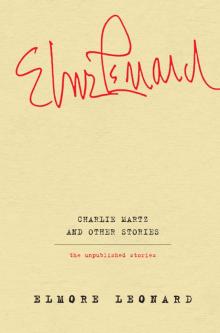 Charlie Martz and Other Stories: The Unpublished Stories
Charlie Martz and Other Stories: The Unpublished Stories Elmore Leonard's Western Roundup #2
Elmore Leonard's Western Roundup #2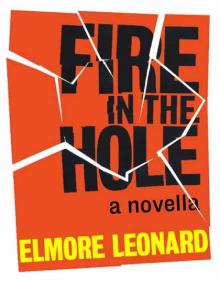 Fire in the Hole
Fire in the Hole Tishomingo Blues (2002)
Tishomingo Blues (2002)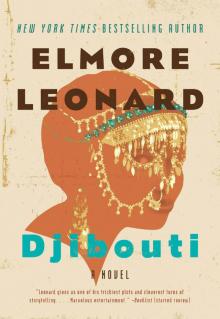 Djibouti
Djibouti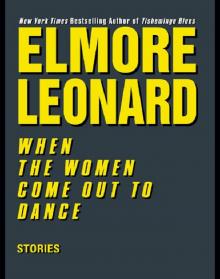 When the Women Come Out to Dance: Stories
When the Women Come Out to Dance: Stories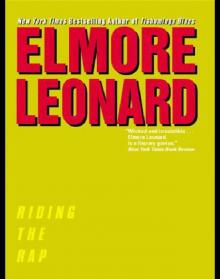 Riding the Rap
Riding the Rap Moment of Vengeance and Other Stories
Moment of Vengeance and Other Stories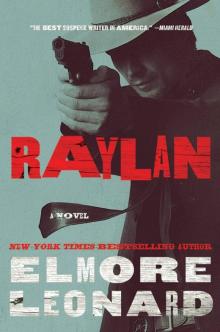 Raylan
Raylan Touch
Touch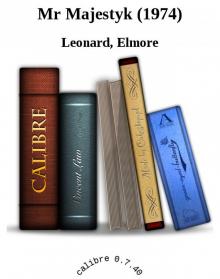 Mr Majestyk
Mr Majestyk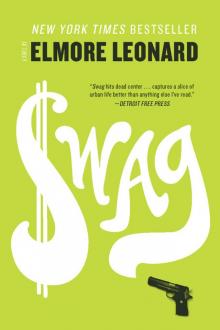 Swag
Swag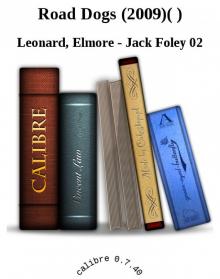 Road Dogs
Road Dogs La Brava
La Brava The Hot Kid
The Hot Kid Valdez Is Coming: A Novel
Valdez Is Coming: A Novel Be Cool
Be Cool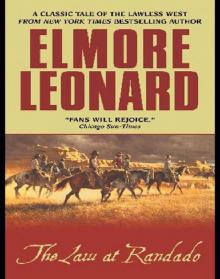 The Law at Randado
The Law at Randado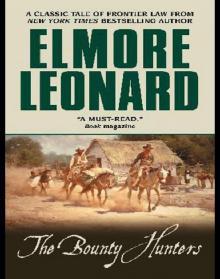 The Bounty Hunters
The Bounty Hunters When the Women Come Out to Dance
When the Women Come Out to Dance 310 to Yuma and Other Stories (1953)
310 to Yuma and Other Stories (1953)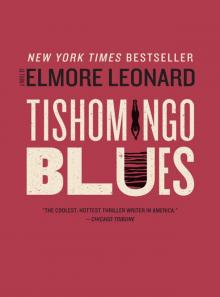 Tishomingo Blues
Tishomingo Blues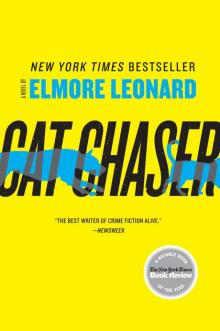 Cat Chaser
Cat Chaser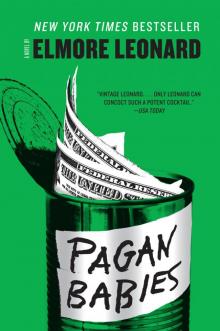 Pagan Babies
Pagan Babies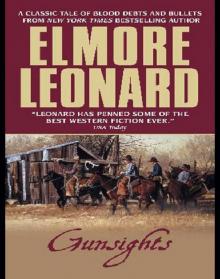 Elmore Leonard's Western Roundup #1
Elmore Leonard's Western Roundup #1 52 Pickup
52 Pickup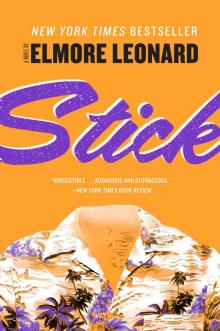 Stick
Stick The Moonshine War
The Moonshine War Valdez Is Coming
Valdez Is Coming City Primeval
City Primeval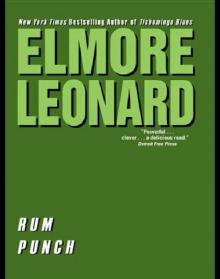 Rum Punch
Rum Punch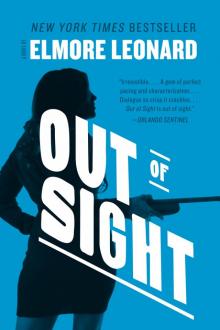 Out of Sight
Out of Sight Naked Came the Manatee (1996)
Naked Came the Manatee (1996)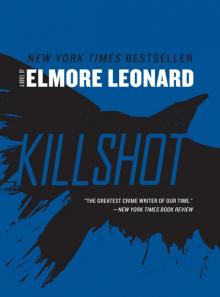 Killshot
Killshot Cuba Libre
Cuba Libre Forty Lashes Less One
Forty Lashes Less One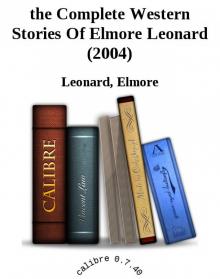 The Complete Western Stories of Elmore Leonard
The Complete Western Stories of Elmore Leonard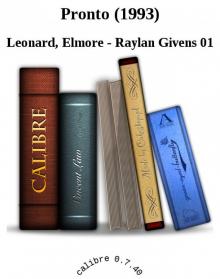 Pronto
Pronto Split Images
Split Images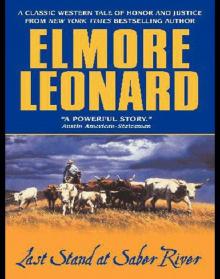 Last Stand at Saber River
Last Stand at Saber River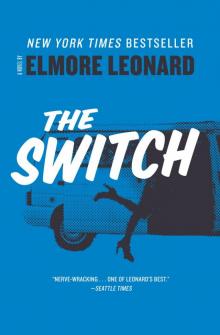 The Switch
The Switch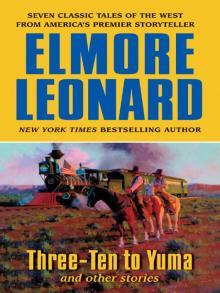 Three-Ten to Yuma and Other Stories
Three-Ten to Yuma and Other Stories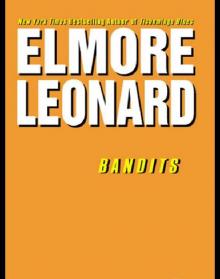 Bandits
Bandits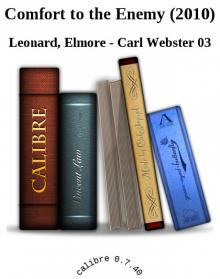 Comfort to the Enemy and Other Carl Webster Stories
Comfort to the Enemy and Other Carl Webster Stories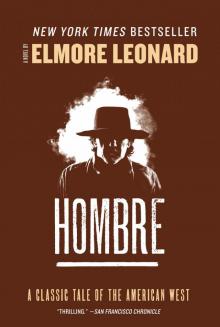 Hombre
Hombre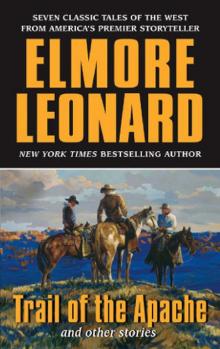 Trail of the Apache and Other Stories
Trail of the Apache and Other Stories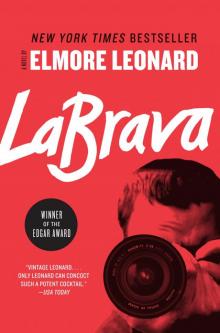 LaBrava
LaBrava Gold Coast
Gold Coast Jackie Brown
Jackie Brown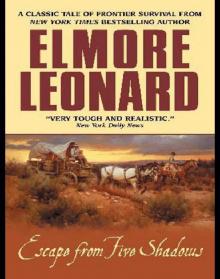 Escape From Five Shadows
Escape From Five Shadows Karen Makes out (1996)
Karen Makes out (1996)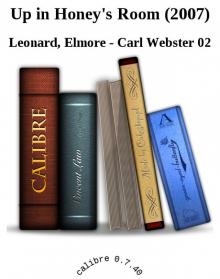 Up in Honey's Room
Up in Honey's Room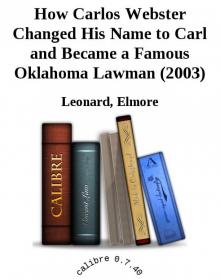 How Carlos Webster Changed His Name to Carl and Became a Famous Oklahoma Lawman (2003)
How Carlos Webster Changed His Name to Carl and Became a Famous Oklahoma Lawman (2003)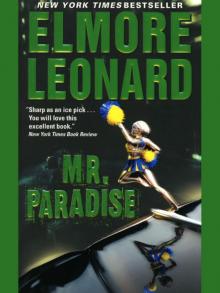 Mr. Paradise
Mr. Paradise The Hunted
The Hunted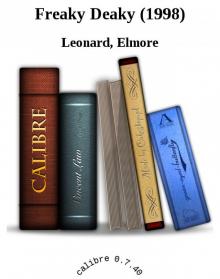 Freaky Deaky
Freaky Deaky Louly and Pretty Boy (Ss)
Louly and Pretty Boy (Ss)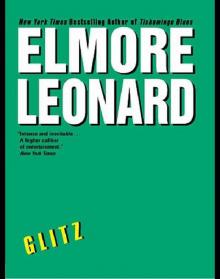 Glitz
Glitz A Coyote's in the House
A Coyote's in the House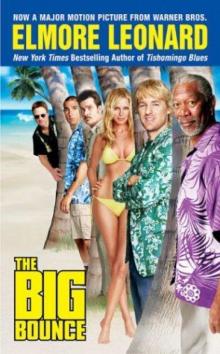 The Big Bounce jr-1
The Big Bounce jr-1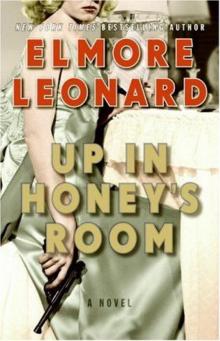 Up in Honey's Room cw-2
Up in Honey's Room cw-2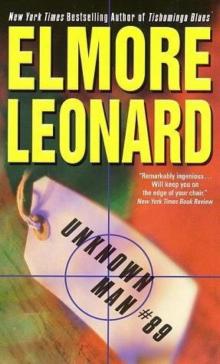 Unknown Man #89 jr-3
Unknown Man #89 jr-3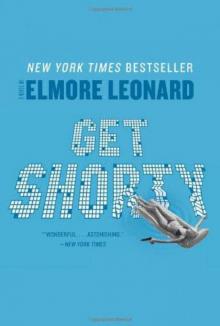 Get Shorty: A Novel cp-1
Get Shorty: A Novel cp-1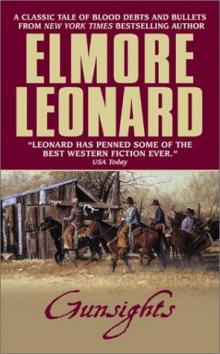 Gunsights
Gunsights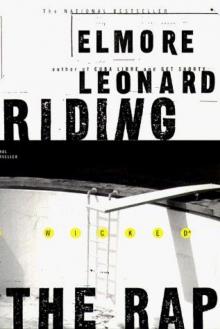 Riding the Rap rg-2
Riding the Rap rg-2